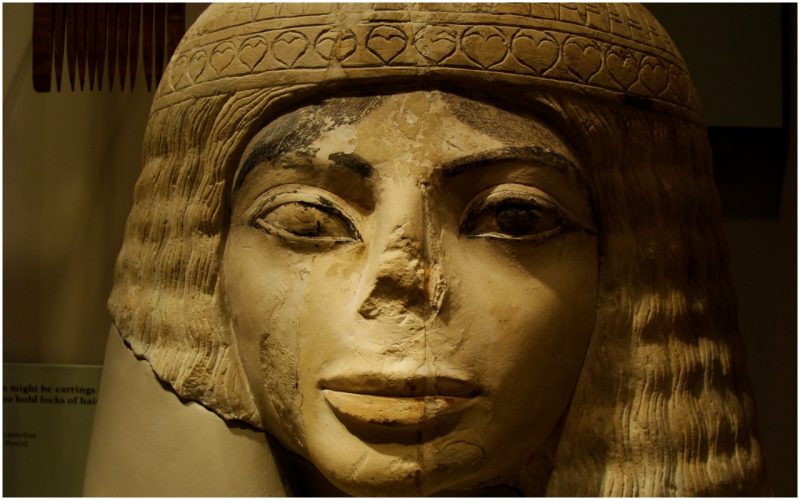Not every U.S. museum can offer a portrayal of ancient Egypt as authentic as the Field Museum of Natural History in Chicago. In its rich collection of artifacts, the museum houses the most significant assembly of mummies to be seen across America, as well as some delicate pieces such as a bronze sculpture depicting the Egyptian deity Bastet. As archaeologists say, this sculpture may keep a mummified cat within.
Among the many other genuine artifacts, there is a bust of a woman. It is a limestone figure with prominent eyes, bony cheeks, and with its nose missing. As this figure reminds people so much of late Michael Jackson, it is said that it has become a pilgrimage point of any true-in-the-heart Michael Jackson fan.
When the King of Pop passed away in 2009, fans reportedly started to come in crowds to the museum just to see this particular piece, The Daily Telegraph wrote at the time. The bust had stood in its corner of the museum for many years, at least two decades before Jackson died, but it hardly attracted that much attention before the death of the music icon.
Museum officials have confirmed such claims. “People are coming from all over the country to see the statue and compare its likeness to the king of pop,” commented the museum’s director of guest relations, Darnell Williams, in August 2009.

The strange-looking artifact was purchased and brought from Cairo at the end of the 19th century. However, it was only in 1988 that it was displayed at the Chicago museum. Details about the bust’s origin are scarce, but archaeologists agree that it was produced in ancient Egypt’s New Kingdom Period, which spanned from 1550 B.C. to 1050 B.C. That could mean the bust was been created when Egypt was under the boy king Tutankhamun, or perhaps when King Ramesses II reigned. We can never be sure, however.
The popularity of the bust continued to linger in the years after Michael Jackson’s death, and while visitors may still come to the museum to primarily see this specific artifact, they are not allowed to touch it. The bust, measuring almost 10 inches in height and some 13.7 inches in width, remains protected behind a glass screen.
People have been particularly dazzled by the similarity of the bust’s nose to that of the King of Pop. Nevertheless, archaeologists have offered several rational explanations on what could have possibly gone wrong with the nose of the woman. Many other Egyptian sculptures, and even sculptures from ancient Greece or Rome, have had their nose or other protruding parts of the body missing or damaged.
Many commentaries explain that this was done to classical statues deliberately and due to religious reasons. Early worshipers of different religions, including Christianity and Islam, defaced the statues so they would make them less profane. Such artifacts have been around for many centuries, and have not always been properly treated and counted as precious, rare, and invaluable as they are today.
Also, a great many artifacts and statues have been unearthed from under tons of sands, mud, or other sediments. Besides noses, some pieces have been found missing other bodily parts, like arms and legs.
If the causes were none of these, then it may have been the archaeologists to blame. In the early days, when archaeology still developed itself as a branch, not everyone was cautious when working in the field. There weren’t too many suitable instruments to work with, either. Damages were surely done to antique pieces this way, too. Whether someone deliberately defaced the bust in Chicago that reminded of Michael Jackson or it was something else, we can never be 100 percent sure.
The chances are that the King of Pop himself probably never saw his almost double from ancient Egypt. Yet everyone remembers Michael Jackson appearing in that ancient Egypt setting video for his 1993 hit “Remember the Time.” All the more reasons why fans find the bust in Chicago particularly striking.
